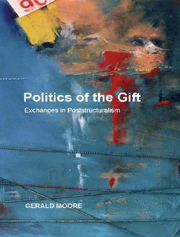Book contents
- Frontmatter
- Contents
- Acknowledgements
- Abbreviations
- Series Editor's Preface
- Introduction: Spectres of Mauss
- 1 Speech, Sacrifice and Shit: Three Orders of Giving in the Thought of Jacques Lacan
- 2 The Eternal Return of the Gift: Deleuze (and Derrida) contra Lacan
- 3 Repeating the Political: Heidegger and Nancy on Technics and the Event
- 4 ‘Pour en finir avec …’: Democracy and Sacrifice
- Conclusion: Variations on a Theme from Nietzsche
- Bibliography
- Index
1 - Speech, Sacrifice and Shit: Three Orders of Giving in the Thought of Jacques Lacan
Published online by Cambridge University Press: 12 September 2012
- Frontmatter
- Contents
- Acknowledgements
- Abbreviations
- Series Editor's Preface
- Introduction: Spectres of Mauss
- 1 Speech, Sacrifice and Shit: Three Orders of Giving in the Thought of Jacques Lacan
- 2 The Eternal Return of the Gift: Deleuze (and Derrida) contra Lacan
- 3 Repeating the Political: Heidegger and Nancy on Technics and the Event
- 4 ‘Pour en finir avec …’: Democracy and Sacrifice
- Conclusion: Variations on a Theme from Nietzsche
- Bibliography
- Index
Summary
Between the publication of the Essai sur le don in 1923–4 and its author's death in 1950, Georges Bataille and Claude Lévi-Strauss did more than most to reciprocate the gift of Mauss's legacy. This reciprocation takes place through an extension of the Maussian critique of homo economicus; Lévi-Strauss and Bataille alike reject the notion of an ontologically grounded, transcendentally individuated human subjectivity. Simultaneously following and radicalising Mauss, both men regard this subject as nothing more than the product of exchange, but also criticise Mauss for an insufficiently ‘general’ understanding of exchange as a ‘total social fact’. Yet to some extent, their respective treatments could hardly have been more different, signalling what one commentator has called ‘a major split in the interpretation of the Maussian gift’ (Pefanis 1991: 22). The split, as Pefanis (somewhat reductively) notes, originates in the shifting emphasis between two different instances of the gift, between the kula, on one hand, and the potlatch, on the other, the circulation and exchange of gifts versus the competition between rivals in which, on occasion, ‘one must expend all that one has and keep nothing back’ (G, 37/200 [TM]). Lévi-Strauss concentrates on the former to articulate a distinctly ‘symbolic’ social reality, in which subjectivity is determined extrinsically, intersubjectively, by unconscious structures of language and linguistic exchange that lie outside and in excess of the subject. Bataille broadly corroborates this account of subjectivity, but praises the destructive ritual of the potlatch precisely for its intimation of a heterogeneous ‘intimacy of the divine world’ in excess of the symbolic order (TR, 44/308).
- Type
- Chapter
- Information
- Politics of the GiftExchanges in Poststructuralism, pp. 32 - 72Publisher: Edinburgh University PressPrint publication year: 2011



